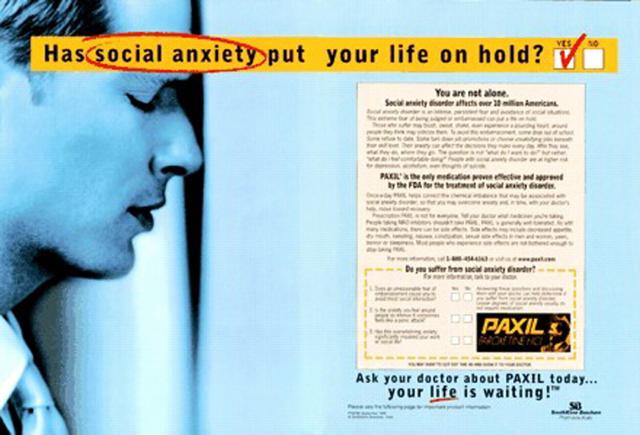Social phobia, also called social anxiety disorder, can lead to alcoholism, drug abuse, job loss, and even suicide. It has been relatively unrecognized in the West compared with in the East, where it is seen as the most common neurotic condition.1 GlaxoSmithKline's recent license to promote the use of paroxetine to treat social phobia looks certain to increase the recognition of this potentially serious condition. What could be wrong with this win-win situation?
The first problem lies in interpreting what a license means. A license is not a statement by the Food and Drug Administration that paroxetine will be effective for treating social phobia. Licenses legally cannot be denied if a treatment can be shown to do something for a condition, but they are no guarantee that this treatment is worth-while. Although simply increasing the recognition of social phobia may reduce the isolation of sufferers, unless sufferers receive an effective treatment that makes a substantial difference in their lives, the treatment may not be worth the risks.
What are the risks? It is clear from studies undertaken by SmithKline in the 1980s that even a brief exposure to paroxetine can lead many takers to become physically dependent.2 Trials have also shown that the use of selective serotonin reuptake inhibitors (SSRIs) can precipitate suicidality in patients and that these agents can cause sexual dysfunction and neurologic disorders.3 Although the SSRIs have been marketed as being freer of side effects than older agents, results on the quality-of-life scales that should reflect this freedom, which have been used in up to 100 clinical trials, have been left unpublished.4 This strongly suggests that SSRIs may be the wrong drugs for many people. All of these hazards could be minimized if SmithKline marketed the hazards of treatment as assiduously as they market the condition.
Unlike obsessive-compulsive disorder, which was recently marketed by companies, social phobia is more like depression—a syndrome that may result from a variety of conditions. In some instances, it may be a prodrome for a psychotic disorder. Whereas some patients may get better with the use of paroxetine, it is sobering to realize that the discovery of the first antidepressant agents came about because they made some patients psychotic. In trials of SSRIs to treat depression, a significant proportion of patients not already having psychosis became psychotic. The same can be expected for social phobia. What people with this potentially debilitating condition need is research to understand why this is the case, rather than the marketing of a drug that may be beneficial for a few sufferers but hazardous for an equally large group.
Undoubtedly some patients with social phobia will not become suicidal, dependent, or psychotic while taking paroxetine, and their quality of life will not be poor. Even these patients have something to worry about, however. When a condition like social phobia becomes a marketing “fig leaf” for a pharmaceutical company, we all lose because the results of clinical trials get sealed—left unpublished and inaccessible—the names of leading figures in the profession get put on ghost-written articles, and a dependence on pharmaceutical company funding develops.5 The renaming of social phobia as social anxiety disorder is symbolic of what can happen.
Finding genuinely breakthrough drugs is a case of finding the right key to unlock the dungeons of illness that imprison us. The marketing clout of modern pharmaceutical companies is such that they can mould and shape the lock in which keys must fit. Marketing paroxetine for social phobia is the kind of diversion likely to inhibit the discovery of long-term solutions.
Figure 1.
Competing interests: Author declares that he has had consultancies with, been a principal investigator or clinical trialist for, and chaired or spoke at international symposia for or received support to attend foreign meetings from Astra, Astra-Zeneca, Boots/Knoll Pharmaceuticals, Eli Lilly, Janssen-Cilag, Lorex-Synthelabo, Lundbeck, Organon, Pharmacia & Upjohn, Pierre-Fabre, Pfizer, Rhone-Poulenc Rorer, Roche, SmithKline Beecham, Solvay, and Zeneca. He has been an expert witness for the plaintiff in 2 legal actions involving SSRIs and has been consulted on cases of attempted suicide, suicide, and suicide-homicide after antidepressant medication was used
References
- 1.Healy D. The Antidepressant Era. Cambridge, MA: Harvard University Press; 1997.
- 2.Rosenbaum JF, Fava M, Hoog SL, Ashcroft RC, Krebs W. Selective serotonin reuptake inhibitor discontinuation syndrome: a randomised clinical study. Biol Psychiatry 1998;44: 77-87. [DOI] [PubMed] [Google Scholar]
- 3.Glenmullen J. Prozac Backlash. New York, NY: Simon & Schuster; 2000.
- 4.Healy D. The assessment of outcome in depression: measures of social functioning. Reviews in Contemporary Pharmacotherapy 2000;11: 295-301. [Google Scholar]
- 5.Healy D. The dilemmas of new and fashionable treatments. Advances in Psychiatric Treatment 2001;7: 322-327. [Google Scholar]



